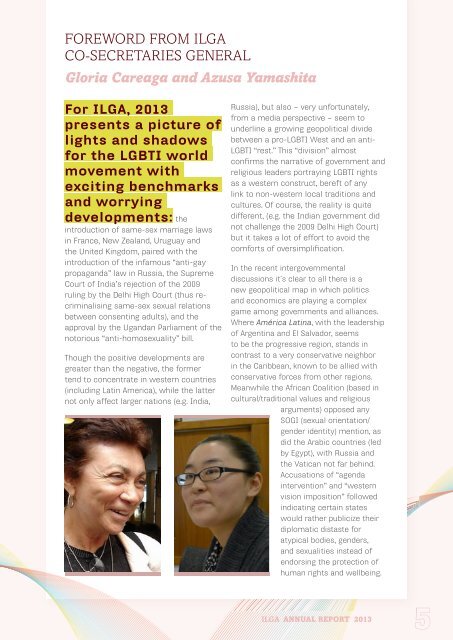73nEjNx1q
73nEjNx1q
73nEjNx1q
You also want an ePaper? Increase the reach of your titles
YUMPU automatically turns print PDFs into web optimized ePapers that Google loves.
FOREWORD FROM ILGA<br />
CO-SECRETARIES GENERAL<br />
Gloria Careaga and Azusa Yamashita<br />
For ILGA, 2013<br />
presents a picture of<br />
lights and shadows<br />
for the LGBTI world<br />
movement with<br />
exciting benchmarks<br />
and worrying<br />
developments: the<br />
introduction of same-sex marriage laws<br />
in France, New Zealand, Uruguay and<br />
the United Kingdom, paired with the<br />
introduction of the infamous “anti-gay<br />
propaganda” law in Russia, the Supreme<br />
Court of India’s rejection of the 2009<br />
ruling by the Delhi High Court (thus recriminalising<br />
same-sex sexual relations<br />
between consenting adults), and the<br />
approval by the Ugandan Parliament of the<br />
notorious “anti-homosexuality” bill.<br />
Though the positive developments are<br />
greater than the negative, the former<br />
tend to concentrate in western countries<br />
(including Latin America), while the latter<br />
not only affect larger nations (e.g. India,<br />
Russia), but also – very unfortunately,<br />
from a media perspective – seem to<br />
underline a growing geopolitical divide<br />
between a pro-LGBTI West and an anti-<br />
LGBTI “rest.” This “division” almost<br />
confirms the narrative of government and<br />
religious leaders portraying LGBTI rights<br />
as a western construct, bereft of any<br />
link to non-western local traditions and<br />
cultures. Of course, the reality is quite<br />
different, (e.g. the Indian government did<br />
not challenge the 2009 Delhi High Court)<br />
but it takes a lot of effort to avoid the<br />
comforts of oversimplification.<br />
In the recent intergovernmental<br />
discussions it´s clear to all there is a<br />
new geopolitical map in which politics<br />
and economics are playing a complex<br />
game among governments and alliances.<br />
Where América Latina, with the leadership<br />
of Argentina and El Salvador, seems<br />
to be the progressive region, stands in<br />
contrast to a very conservative neighbor<br />
in the Caribbean, known to be allied with<br />
conservative forces from other regions.<br />
Meanwhile the African Coalition (based in<br />
cultural/traditional values and religious<br />
arguments) opposed any<br />
SOGI (sexual orientation/<br />
gender identity) mention, as<br />
did the Arabic countries (led<br />
by Egypt), with Russia and<br />
the Vatican not far behind.<br />
Accusations of “agenda<br />
intervention” and “western<br />
vision imposition” followed<br />
indicating certain states<br />
would rather publicize their<br />
diplomatic distaste for<br />
atypical bodies, genders,<br />
and sexualities instead of<br />
endorsing the protection of<br />
human rights and wellbeing.<br />
ILGA ANNUAL REPORT 2013


